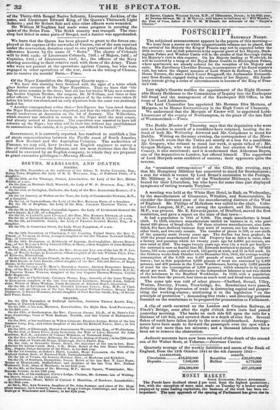A meeting was held at the White Hart Hotel, in
Bath, on Wednesday,. by the manufacturers of Gloucester, Wiltshire, and Somersetshire to consider the distressed state of the manufacturing districts of the West of England. Mr. Phillips of Melksham was called to the chair. Colonel Gore Langton, M.P., was among the speakers, and Mr. Staunton, M.P., was present. Mr. E. Edwardsjunior, of Bradford, moved the first resolution, and gave a report on the state of that town— It had a population in 1841 of 8,309. The staple manufacture is broad cloth. In 1820, nineteen manufacturers carried on business in it, who pro;Pe/ duced 620 pieces of broad cloth. Of these nineteen manufacturers, nine have failed, five have declined business from want of success, one has taken to another trade, and two only remain. The number of pieces is 100, or one-sixth of the quantity made twenty years ago. The decline has been gradual; in 1838 the pieces manufactured were 144. Property has so fallen in value, that a factory and premises which let twenty years ago for 4,200/. per annum, are now rated at 300/. The wages twenty years ago were 15s. a week per family— the contrast is now so fearful that Mr. Edwards hesitated to declare it. Of 462 looms, 316 were entirely out of work, 135 partly at work, and 11 in full work. In the thirteen weeks from October 1st to December 31st, 1841, the average weekly consumption of the 8,309 was 9,497 pounds of meat, and 9,437 quarternloaves ; but in this population 6,000 pounds of meat are consumed by 2,400 persons, and 409 pounds in the Union Workhouses, leaving only 3,088 pounds of meat for the consumption of 5,909 persons; which amounts to 8/ ounces • ahead per week. The allowance to the independent labourer is not two-thirds of the minimum in the Bradford Workhouse. In 1820, with a population much less than the present, four times as much meat and bread were consumed.
The same tale was told of other places—Chalford, Stroud, Ulley, Wotton, Dursley, Frome, Trowbridge, &c. Resolutions were passed, declaring that the depression of trade is destroying capital and pauperizing the working-classes; attributing it to the legislation "on the principle of protection "; demanding free trade ; and directing petitions. founded on the resolutions to be prepared for presentation to Parliament.


























 Previous page
Previous page